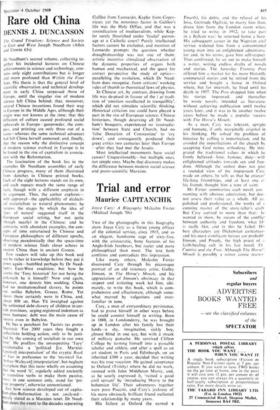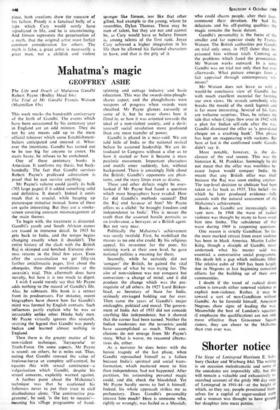Trial and error
Maurice CAPITANCHIK
Joyce Cary: A Biography Malcolm Foster (Michael Joseph 70s)
Two of the photographs in this biography show Joyce Cary as a fierce young officer of the colonial service, circa 1915, and as an elegant, handsome sage of sixty-five, with the aristocratic, bony features of his Anglo-Irish forebears, but racier and more philosophical than most. The text both confirms and contradicts this impression.
Like many others, Malcolm Foster discovered Cary through his picaresque portrait of an old visionary artist, Gulley Jimson, in The Horse's Mouth, and his appreciation of Jimson's obstinacy in that suspect and irritating work led him, ulti- mately, to write this book, which is com- prehensive and affectionate, although some- what marred by vulgarisms and over- familiar in tone.
Cary, a man of extraordinary persistence, had to prove himself in other ways before he could commit himself to writing. Born in 1888, in Londonderry, he was brought up in London after his family lost their lands—a shy, imaginative, sickly boy, almost blind in one eye, but with a streak of military panache. He survived Clifton College by turning himself into a passable scholar and athlete, and after a spell as an art student in Paris and Edinburgh, on an inherited £300 a year, decided that writing was his true vocation. He gained acceptance to Oxford (Trinity) where he did no work, roomed with John Middleton Murry, and, as he sourly expressed it, 'ruined a good civil servant' by 'introducing Murry to the bohemian life'. Their adventures together were pure Puccini, and Cary's jealousy of his more obviously brilliant friend outlasted their relationship by many years.
His failure at Oxford (he earned a
Fourth), his debts, and the refusal of his love, Gertrude Ogilivie, to marry him then. drove him from the London room where he tried to write, in 1912, to take part in a Balkan war: he returned home a hero. His subsequent career in the Nigerian civil service widened him from a conventional young man into an enlightened administra- tor and, in his terms, gave him self-respect. Thus confirmed, he set out to make himself a writer. writing endless drafts of novels and stories. The Saturday Evening Post offered him a market for his more blatantly commercial stories and he retired from the service and bought a house in Oxford where, but for intervals, he lived until his death in 1957. The Post dropped him when his stories improved, and thereafter he wrote novels, intended as literature. without achieving publication until twelve years later, and it was to be another twelve years before he made a popular success with The Horse's Mouth.
As a man. Cary was tolerant, upright and humane, if only marginally original in his thinking. He solved the problem of injustice by calling it imperfection, and he avoided the imperfections of the church by accepting God minus orthodoxy. He inte- grated the traditional values in which he firmly believed—love, honour, duty—with enlightened attitudes towards sex and free- dom. Although the author does not give a rounded view of the impression Care made on others, he tells us that he enioyee life-long friendships. and at least one o' his friends thought him a type of saint.
Mr Foster summarises each novel. con menting with obvious admiration, but doe• not assets their value as a whole. All arc polished and professional, the works of cunning master of the story-teller's craft But Cary aspired to more than that: he wanted to show, by means of the conflict between authority and freedom, what lift is really like, and in this he failed. Hoc best characters are Dickensian caricature- and his most sienificant heroes are probabh Jimson, and Preedy, the high priest of faith-healing cult in his last novel. Th Captive and the Free. Although The Horse', Mouth is possibly a minor comic master
piece, both creations show the measure of his failure. Preedy is a fanatical bully of a type which Cary would surely have repudiated in life, and he is unconvincing. And Jimson represents the perpetuation of a myth, that the original artist must forfeit common consideration for others. The myth is false, a great artist is necessarily a great man, not a childish and violent sponger like Brawn, nor like that other gifted, bad example to the young, whom he resembles, Dylan Thomas. These may be men of talent, but they are not and cannot be, as Cary would have us believe Jimson is, among talents of the first rank. Joyce Cary achieved a higher integration in his life than he allowed his fictional characters to have, and that is the pity of it.



































 Previous page
Previous page